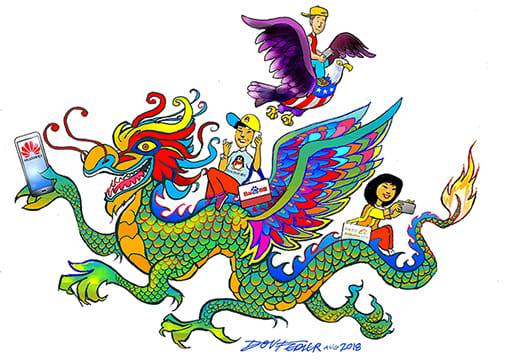
Much of the dialogue about generations – and Millennials in particular – centres on the West. But it is the Chinese Millennial that will likely have the greatest influence on the world.
Everyone is talking about them
Everyone seems to be talking about Millennials these days. This generational cohort – those born between 1981 and 1996 – is particularly important right now, for two important reasons. Firstly, it’s the biggest generation since the Baby Boomers. Secondly, in terms of decision-making and spending power, it’s the generation that’s starting to come into its own. Older Millennials are already moving into key roles in business, politics and the arts. They will increasingly be the ones setting policies, pioneering new products, controlling budgets and defining cultural trends. They will, more and more, be the ones to make the decisions for everyone else, based on their experiences, worldviews and even their prejudices.
This generation’s decisions will affect all of us, in every generation, so it’s important to get a handle on what makes them tick. To do that we have to wade through a vast amount of research and commentary. A lot of it is speculative, anecdotal and not very scientific. And we have to look beyond traditional markets (the US and Europe), particularly at the large emerging markets of the Far East, like China and India, if we are going to understand it properly.
Defining the generations
Generation | Born between |
Silent (or Great) | 1928 and 1945 |
Baby boomers | 1946 and 1964 |
Generation X | 1965 and 1980 |
Millennials | 1981 and 1996 |
Post-millennials (Generation Z) | 1997 onwards |
Source: Pew Research
Note: Different research houses will have different date ranges, so it’s important to bear this in mind when reading analysis or research
Are there any broad conclusions we can draw about Millennials globally?
According to the US Census Bureau, the Baby Boomers are the only generation that can be regarded as “demographically significant”, so conclusions drawn about the generations that have followed need to be taken with a statistical pinch of salt. There are all sorts of futurists, podcasters and consultants giving their opinions on the topic and who are understandably talking their books.
However, there are two broad conclusions we can draw about Millennials with some degree of certainty:
They are digital natives. The advent of the internet and mobile telephony in the early to mid-1990s means that this is the first generation to have grown almost completely with these technologies around them. This shapes the way they communicate, gather information and solve problems.
They are better educated than any other generation before them. There are many reasons for this. One is the Global Financial Crisis of 2008-2009 and the subsequent Eurozone debt crisis that hit many European countries in the following years. A lack of job opportunities for young graduates in many countries forced Millennials to go back to university or college to acquire new skills. The internet has expanded opportunities in distance learning, by making courses available online, around the world. The drive to increase one’s knowledge base has never been greater, nor has the opportunity to do so.
This last point is cause for some optimism in a world of angry politics and populism. Higher levels of education should hopefully mean a higher quality of leadership in business, government and NGOs, and hence better equip our institutions to meet the world’s big challenges.
Other characterisations of Millennials, for example, that they have grand aspirations for themselves and the world, care more about the environment and society than previous generations and value experiences over possessions, are perhaps less clear. These aspects may also differ from country to country. So too, optimism about the future: how does a Millennial in Europe see the world compared with counterparts in Asia, particularly in China? This brings us to our next point.
Are we paying enough attention to Chinese Millennials?
US analysts speak of Millennials as the “Echo Boom” since, in terms of size, they are almost as big as the Baby Boomers at their peak. Estimates for US Millennials are between 66 million and 80 million, depending on the range of years chosen to define them. About 80 million Baby Boomers were born in the US, including the last four presidents.
But this number is dwarfed by the number of Chinese Millennials – estimated to be 400 million. With China set to become the world’s largest economy 10-15 years from now, Millennials and their spending power will play an important part in that growth. And it’s not just about their spending power, but also their influence: as they mature, they will take up key positions in government, academia and China’s increasingly global companies. Their decisions will have repercussions and outcomes around the world.
So it’s important to understand their propensity to spend, their embrace of technology and their worldview.
The first thing to remember when analysing any generation is to understand the key political, sociological, health and technological environments that shape them. Like their counterparts in the West, Chinese Millennials are digital natives with a thirst for education, but what drives these two characteristics is slightly different.
BATs vs FAANGs
Firstly, because many of the social media applications so well known in the West are restricted in China, Chinese Millennials' experience is less through the FAANGs (Facebook, Amazon, Netflix and Google) than through the BATs (Baidu, Ali Baba and Tencent). The BATs' applications are heavily monitored by the government but they are also highly sophisticated in the way they deliver games and transactional capabilities.
As a result, Chinese Millennials are early adopters when it comes to new ways of interacting and transacting online and on mobile applications. According to Daxue Consulting, 73% of Chinese Millennials shopped online in 2015, compared with 35% of US Millennials. And to give a feel for the value of this market, Daxue reckons Millennials shelled out US$5.5 trillion through third-party mobile payment platforms like Alipay, Tenpay and QQ Wallet.
Daxue adds that Chinese Millennials nonetheless save more than their US counterparts: they save 22% of their income, as opposed to 7.5% with their US counterparts. So there is a significant propensity to spend in the future – supported by the findings of a McKinsey survey last year which shows that particularly those born after 1990 are more than willing to spend on themselves.
Like the Boomers
This leads to the question of outlook. As noted above, a generation is often shaped by the big issues, technologies and events of their times. Millennials in the West face challenges like the rising cost of housing and a competitive job market that pushes many into the “gig economy” – working as contractors and with little in the way of job security and the benefits that come with a full-time job – that has become more common since the Global Financial Crisis. According to Deloitte’s 2018 Millennial Survey (which only included a small sample of Chinese Millennials), “Younger workers are increasingly uneasy about the future, pessimistic about prospects for political and social progress, and harbour growing concerns about safety, social equality, and environmental sustainability.”
The picture in China is different. The country has had many years of uninterrupted growth, first emerging as a manufacturing powerhouse and now as a consumer powerhouse as well. The rising diplomatic status that goes with its economic growth has instilled a patriotic pride among its Millennials that in turn goes hand in hand with rising incomes. Both of these help build an optimistic outlook on life.
In this way, the Chinese Millennial is very much like the US Baby Boomer during the heydays of the 1950s and 1960s, who enjoyed the fruits of the growth in prosperity that followed the Second World War.
According to the McKinsey report on Asian Millennials, the life of the younger Chinese Millennial differs significantly from the generations that went before. Prosperity is the norm for them – a far cry from the privations of previous generations during Mao’s infamous Cultural Revolution.
This new cohort is self-confident, patriotic and keen to spend on luxury goods, travel and experiences.
The Chinese Millennials are also the product of the one-child policy introduced in 1979. This means that not only are they doted on by parents, but they also feel the pressure to achieve, academically and in business.
Conclusion – cause for optimism (and caution)
Millennials’ embracing of technology and drive for further education are, despite worries about the future, causes for optimism in the world. It hopefully means the stewardship of the world’s companies, institutions and governments should be in more and more capable – and diverse – hands. Millennials’ skill set and attitudes are hopefully an antidote to the populism and isolationism that besets politics in the world right now.
China’s Millennials will play their part in this optimistic view of the world, perhaps outflanking their counterparts in the US and elsewhere, through sheer numbers and skill set. They will likely become the major market for products and services, like luxury, travel and technology. They will also drive many of the world’s innovations in the years ahead and many of their products will likely dominate their global segments.
Nonetheless, there are some big questions that need to be asked: Will Chinese Millennials (and the next generation, Generation Z) remain happy to fall in line with the demands of the Communist Party, or will they demand a greater say in electing politicians or accessing foreign social media platforms? How will the authorities react to demands for greater individual liberties?
And how will the new generation of Chinese leaders in all fields view the rest of the world and its aspirations? Will China be a force for good in the world? These are questions that only time can give the answer to.
About the author

Patrick Lawlor
Editor
Patrick writes and edits content for Investec Wealth & Investment, and Corporate and Institutional Banking, including editing the Daily View, Monthly View, and One Magazine - an online publication for Investec's Wealth clients. Patrick was a financial journalist for many years for publications such as Financial Mail, Finweek, and Business Report. He holds a BA and a PDM (Bus.Admin.) both from Wits University.
Receive Focus insights straight to your inbox




